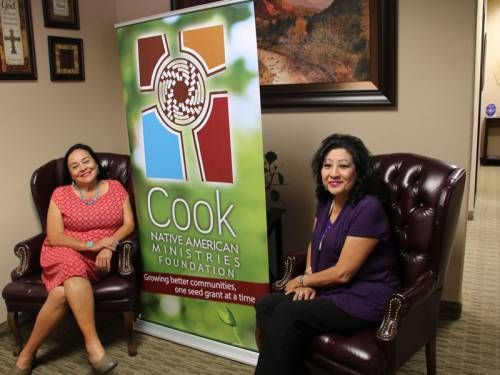Charles H. Cook left a legacy of education and sacrifice
November 5, 2019
This is the first of two stories featuring the Cook Native American Ministries Foundation. A second story will run Nov. 6.

Wendy Weston, at left, is executive director and CEO of the Cook Native American Ministries Foundation. Della Peña, at right, has been associated with the Cook School for most of her life. (Contributed photo)
A nationally renowned theological college with roots in both Christian and Native American spiritual beliefs and culture has trained hundreds of Native people to take the gospel — and the good works it inspires — to their own tribal communities for more than 100 years.
In December 1870, German immigrant Charles H. Koch — who would Anglicize his name to Cook — first came to Sacaton, Arizona, on the Gila River Indian Community.
“When he first arrived, Cook was a teacher and also shared the Word of God through his ministry to the Akimel O’odham people,” said Cook Native American Ministries Executive Director and CEO Wendy Weston. The Akimel O’odham, one of two tribal cultures in the community whose lands are just south of Phoenix, are also known as Pima.
Cook College and Theological School closed in 2008 after enrollment declined, and Cook Memorial Presbyterian Church burned in March.
But Cook’s legacy of education and personal sacrifice endures. The ministry started by a minister who spoke the Pima language with a German accent to share the gospel continues through the Cook Native American Ministries Foundation.
“The Presbyterian Foundation and its subsidiary, New Covenant Trust Company, has been thrilled to be a long-time supporter of the Cook Foundation and its predecessor school. We have members on the Cook Board. We have provided strategic planning support, stewardship and fundraising education, consultation and we have helped Cook to network nationally with other First Nation peoples,” says Tom Taylor, president and CEO of the Presbyterian Foundation.
In 1871, Cook reported that the school encountered obstacles such as being unable to communicate with students from Gila River’s other culture, the Maricopa.
But Cook and his first wife, Anna, persevered. “[Cook] made every effort to learn the Pima language while his young students learned English from him with a German accent,” said Cecil Corbett, former student and later president of Cook College and Theological School.
About 10 years later, Cook was ordained as a minister in the Presbyterian Church. He established the First Pima Presbyterian Church congregation in 1889, which still meets today.
After nearly 40 years ministering to the Pima and Maricopa and undergoing personal trials when his first wife died, Cook founded Cook Bible School in 1911 to train Native people to take the gospel to their tribal communities.
Cook Memorial Church in Sacaton was consecrated in 1918, the year after Cook died, and his wife and at least one of their children are buried there. A new church was constructed in the 1980s, but the historic church was preserved and placed on the National Register of Historic Places in 1975.
Cook Bible School was always a place for family, faith and community. Della Peña, who has spent nearly her entire life associated with the Cook School, is one of those family members who found her purpose through this association. “My mother and father were students in the 1940s,” when the school was across the street from the Phoenix Indian School, said Peña.
Central Presbyterian Church, which continues to serve the Phoenix-area Native community, was part of the campus.

Very little remains of a time capsule buried on the campus of the Cook School. (Contributed photo)
In 1965, the school purchased 17 acres in Tempe, Arizona, to be its permanent campus. Over the following 43 years, Cook Bible College, later known as Cook College and Theological School, became a magnet for the training of Christian pastors who would serve on American Indian reservations across the country.
But because the college offered only associate degrees, many students chose colleges that offered more advanced training, while others went for online education. The decision was made to close.
Peña recalls digging up a time capsule on campus. “We had to take down a warrior sculpture that had been made from chicken wire and putty [among other materials]. I went to see the sculpture being taken down and retrieve the time capsule. There wasn’t much left,” she said. “There was a plastic gift bag, pieces of the dirt that was under the sculpture and one spiral binding that was probably from a yearbook that had disintegrated.”
Those items are now on display at the new office of the next incarnation of Cook’s ministry — the Cook Native American Ministries Foundation, less than a mile from the old campus.
Debra Utacia Krol for The Presbyterian Foundation. Krol reports on Native issues, environmental and science issues and art. She is an enrolled member of the Xolon (also known as Jolon) Salinan Tribe from the Central California coastal ranges.
Daily Readings
Morning Psalms 42; 146
First Reading Nehemiah 12:27-31a, 42b-47
Or alternate First Reading Ezra 4:7, 11-24
Second Reading Revelation 11:1-19
Gospel Reading Matthew 13:44-52
Evening Psalms 102; 133
Today’s Focus: Cook Native American Ministries
Let us join in prayer for:
PC(USA) Agencies’ Staff
Tamron Keith, Presbyterian Mission Agency
Stephen Keizer, Presbyterian Foundation
Let us pray:
Creator God, thank you for lifting us from shadows of darkness to lives of love, joy and peace through your Son, Jesus Christ. Guide your people as they share the gospel with those in need of you. Grant us your peace. Amen.